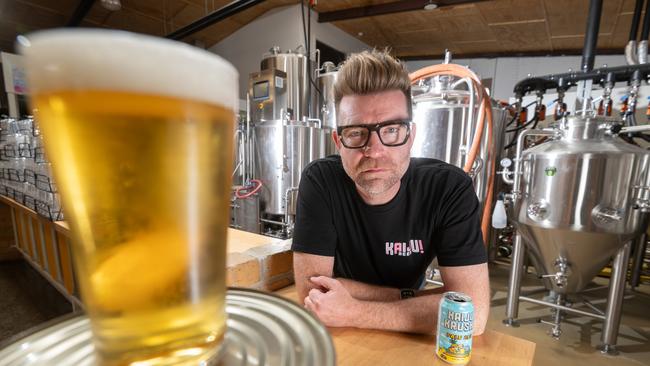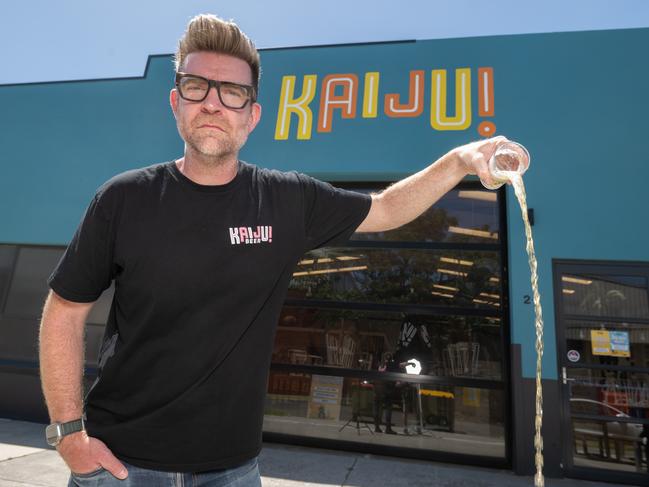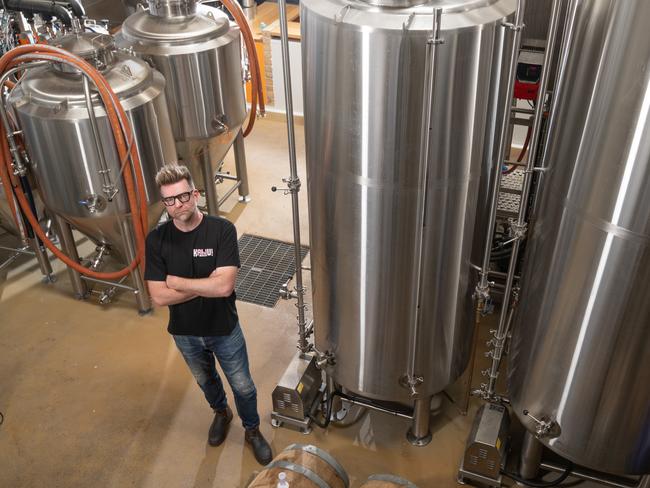Melbourne craft brewer Kaiju puts forward rescue deal amid $5m debt pile
The owners of Melbourne craft beer brewer Kaiju say alcohol taxes imposed by the government created a “valley of death for profitability”, after their business collapsed into insolvency amid a $5m debt pile.

News
Don't miss out on the headlines from News. Followed categories will be added to My News.
The owners of a Melbourne craft beer brewer have blamed ever-increasing and unfair taxes for the downfall of their business, saying governments had created a “valley of death” for many in the sector.
The comments came as award-winning brewer Kaiju put forward a rescue plan to creditors after it earlier called in administrators amid a $5m debt pile.
South East Brewing Company, which trades as Kaiju Beer, located in Dandenong South in Melbourne’s southeast, entered administration earlier this month.
In an offer to creditors – who face getting back as little as 15c on the dollar – Kaiju owners Nathaniel and Callum Reeve said excise tariffs and Victoria’s cash-for-container deposit scheme had played a major role in its financial woes.
“Excise tariffs increased at an unprecedented rate during this period and container deposit schemes were introduced in most states, including our highest value state of Victoria,” they said in a report lodged by Kaiju’s administrator with the corporate regulator.
“Additionally, the changes to the excise remission (from $100,000 to $350,000) caused us to be in a valley of death for profitability.
“New entrants have flooded the market who don’t need to pay excise as they are under the cap. We were already over the new cap.”

The Reeves, who are brothers, said the new tax structure resulted in an “extremely unusual and artificial market” where the smallest competitors in the market were able to produce goods for far cheaper than larger businesses.
“Medium size breweries like ours between about 300,000L and several million litres are squeezed from both smaller breweries (under the excise cap) and larger ones (highly advantageous economies of scale),” they said.
Kaiju was awarded Champion Medium Australian Brewery at the Australian International Beer Awards last year.
Its products are sold at major liquor outlets including Dan Murphy’s and Liquorland.
Creditors will vote next week on whether to accept a rescue deal which will give unsecured creditors, owed just under $4m, 15c on the dollar.
Employees, however, who are owed $215,230 will get paid out in full.
DBA Reconstruction and Advisory managing director Atle Crowe-Maxwell warned creditors were likely to receive 0 to 10c on the dollar if they rejected the rescue plan and wound the company up.
Under the plan, the Reeves will inject an undisclosed amount of cash within 12 months of the commencement date to settle all creditor claims.
All other assets, including cash at the bank and receivables of the company, will be retained by the business.
Mr Crowe-Maxwell’s report put the company’s total assets at $1.6m, including cash at the bank ($362,035), plant and equipment ($519,330) and stock and inventory ($102,450).

The cash contribution will be first paid to administrators, then to non-continuing employees and lastly unsecured creditors.
Unsecured creditors included trade creditors owed $278,783, related-party creditors owed $880,328 and the tax office owed $2.7m, the report revealed.
Secured creditors are owed $941,376.
Along with the amount owed to employees, total liabilities weigh in at $5,095,514.
The company’s books show total sales took a hit from $6.4m in FY23, to $5.4m in FY24 and $3m year to date in 2025.
Nathaniel and Callum said they had “almost straight line strong growth” from 2017 to 2021 which put considerable stress on their ability to produce stock.
“We therefore undertook capital expansion using accrued earnings and secured bank finance to increase our production capacity,” they said.
“Unfortunately by the time all the new production equipment had come online our sales began to decline in a way we could not have predicted.”
The directors said they also felt the effects of a public’s lack of spending on discretionary items like beer during a cost of living crisis.
The brothers said they have already implemented changes to the business to make it more profitable including reducing annual wages from $1.7m to $983,000 by making staff redundant and giving directors “large pay cuts”.
“All other costs were assessed for relevance within a declining market and although we negotiated with suppliers, many of our costs only increased,” they said.
“Softening consumer demand meant that not all of the cost increases could be passed on while remaining competitive.”
They said they responded by introducing lower priced products into the market which was “beginning to see traction”.




